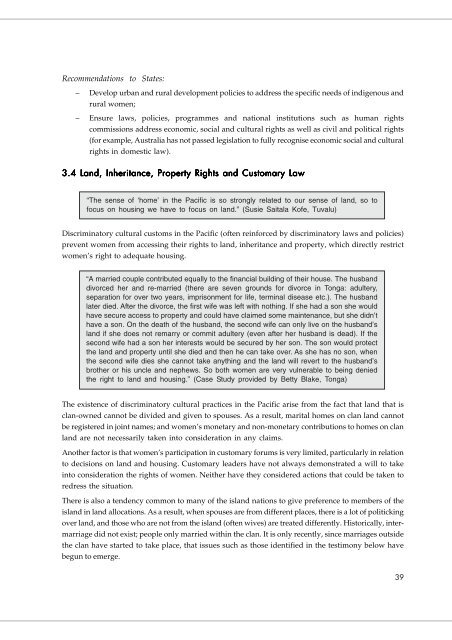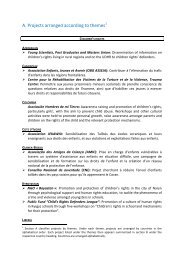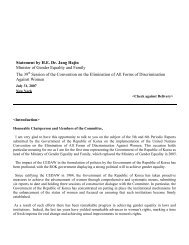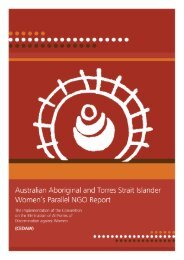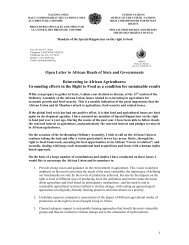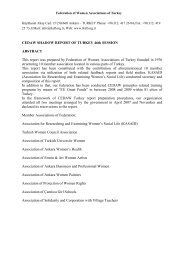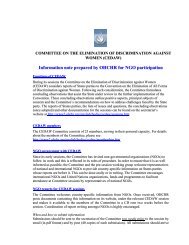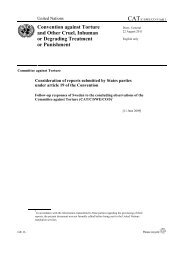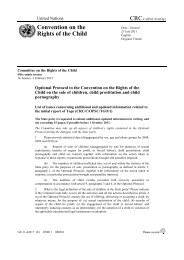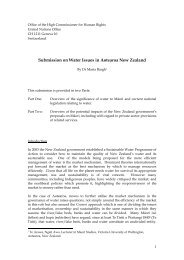Report - Office of the High Commissioner on Human Rights
Report - Office of the High Commissioner on Human Rights
Report - Office of the High Commissioner on Human Rights
- No tags were found...
You also want an ePaper? Increase the reach of your titles
YUMPU automatically turns print PDFs into web optimized ePapers that Google loves.
Recommendati<strong>on</strong>s to States:<br />
– Develop urban and rural development policies to address <str<strong>on</strong>g>the</str<strong>on</strong>g> specific needs <str<strong>on</strong>g>of</str<strong>on</strong>g> indigenous and<br />
rural women;<br />
– Ensure laws, policies, programmes and nati<strong>on</strong>al instituti<strong>on</strong>s such as human rights<br />
commissi<strong>on</strong>s address ec<strong>on</strong>omic, social and cultural rights as well as civil and political rights<br />
(for example, Australia has not passed legislati<strong>on</strong> to fully recognise ec<strong>on</strong>omic social and cultural<br />
rights in domestic law).<br />
3.4 Land, Inheritance, Property <strong>Rights</strong> and Customary Law<br />
“The sense <str<strong>on</strong>g>of</str<strong>on</strong>g> ‘home’ in <str<strong>on</strong>g>the</str<strong>on</strong>g> Pacific is so str<strong>on</strong>gly related to our sense <str<strong>on</strong>g>of</str<strong>on</strong>g> land, so to<br />
focus <strong>on</strong> housing we have to focus <strong>on</strong> land.” (Susie Saitala K<str<strong>on</strong>g>of</str<strong>on</strong>g>e, Tuvalu)<br />
Discriminatory cultural customs in <str<strong>on</strong>g>the</str<strong>on</strong>g> Pacific (<str<strong>on</strong>g>of</str<strong>on</strong>g>ten reinforced by discriminatory laws and policies)<br />
prevent women from accessing <str<strong>on</strong>g>the</str<strong>on</strong>g>ir rights to land, inheritance and property, which directly restrict<br />
women’s right to adequate housing.<br />
“A married couple c<strong>on</strong>tributed equally to <str<strong>on</strong>g>the</str<strong>on</strong>g> financial building <str<strong>on</strong>g>of</str<strong>on</strong>g> <str<strong>on</strong>g>the</str<strong>on</strong>g>ir house. The husband<br />
divorced her and re-married (<str<strong>on</strong>g>the</str<strong>on</strong>g>re are seven grounds for divorce in T<strong>on</strong>ga: adultery,<br />
separati<strong>on</strong> for over two years, impris<strong>on</strong>ment for life, terminal disease etc.). The husband<br />
later died. After <str<strong>on</strong>g>the</str<strong>on</strong>g> divorce, <str<strong>on</strong>g>the</str<strong>on</strong>g> first wife was left with nothing. If she had a s<strong>on</strong> she would<br />
have secure access to property and could have claimed some maintenance, but she didn’t<br />
have a s<strong>on</strong>. On <str<strong>on</strong>g>the</str<strong>on</strong>g> death <str<strong>on</strong>g>of</str<strong>on</strong>g> <str<strong>on</strong>g>the</str<strong>on</strong>g> husband, <str<strong>on</strong>g>the</str<strong>on</strong>g> sec<strong>on</strong>d wife can <strong>on</strong>ly live <strong>on</strong> <str<strong>on</strong>g>the</str<strong>on</strong>g> husband’s<br />
land if she does not remarry or commit adultery (even after her husband is dead). If <str<strong>on</strong>g>the</str<strong>on</strong>g><br />
sec<strong>on</strong>d wife had a s<strong>on</strong> her interests would be secured by her s<strong>on</strong>. The s<strong>on</strong> would protect<br />
<str<strong>on</strong>g>the</str<strong>on</strong>g> land and property until she died and <str<strong>on</strong>g>the</str<strong>on</strong>g>n he can take over. As she has no s<strong>on</strong>, when<br />
<str<strong>on</strong>g>the</str<strong>on</strong>g> sec<strong>on</strong>d wife dies she cannot take anything and <str<strong>on</strong>g>the</str<strong>on</strong>g> land will revert to <str<strong>on</strong>g>the</str<strong>on</strong>g> husband’s<br />
bro<str<strong>on</strong>g>the</str<strong>on</strong>g>r or his uncle and nephews. So both women are very vulnerable to being denied<br />
<str<strong>on</strong>g>the</str<strong>on</strong>g> right to land and housing.” (Case Study provided by Betty Blake, T<strong>on</strong>ga)<br />
The existence <str<strong>on</strong>g>of</str<strong>on</strong>g> discriminatory cultural practices in <str<strong>on</strong>g>the</str<strong>on</strong>g> Pacific arise from <str<strong>on</strong>g>the</str<strong>on</strong>g> fact that land that is<br />
clan-owned cannot be divided and given to spouses. As a result, marital homes <strong>on</strong> clan land cannot<br />
be registered in joint names; and women’s m<strong>on</strong>etary and n<strong>on</strong>-m<strong>on</strong>etary c<strong>on</strong>tributi<strong>on</strong>s to homes <strong>on</strong> clan<br />
land are not necessarily taken into c<strong>on</strong>siderati<strong>on</strong> in any claims.<br />
Ano<str<strong>on</strong>g>the</str<strong>on</strong>g>r factor is that women’s participati<strong>on</strong> in customary forums is very limited, particularly in relati<strong>on</strong><br />
to decisi<strong>on</strong>s <strong>on</strong> land and housing. Customary leaders have not always dem<strong>on</strong>strated a will to take<br />
into c<strong>on</strong>siderati<strong>on</strong> <str<strong>on</strong>g>the</str<strong>on</strong>g> rights <str<strong>on</strong>g>of</str<strong>on</strong>g> women. Nei<str<strong>on</strong>g>the</str<strong>on</strong>g>r have <str<strong>on</strong>g>the</str<strong>on</strong>g>y c<strong>on</strong>sidered acti<strong>on</strong>s that could be taken to<br />
redress <str<strong>on</strong>g>the</str<strong>on</strong>g> situati<strong>on</strong>.<br />
There is also a tendency comm<strong>on</strong> to many <str<strong>on</strong>g>of</str<strong>on</strong>g> <str<strong>on</strong>g>the</str<strong>on</strong>g> island nati<strong>on</strong>s to give preference to members <str<strong>on</strong>g>of</str<strong>on</strong>g> <str<strong>on</strong>g>the</str<strong>on</strong>g><br />
island in land allocati<strong>on</strong>s. As a result, when spouses are from different places, <str<strong>on</strong>g>the</str<strong>on</strong>g>re is a lot <str<strong>on</strong>g>of</str<strong>on</strong>g> politicking<br />
over land, and those who are not from <str<strong>on</strong>g>the</str<strong>on</strong>g> island (<str<strong>on</strong>g>of</str<strong>on</strong>g>ten wives) are treated differently. Historically, intermarriage<br />
did not exist; people <strong>on</strong>ly married within <str<strong>on</strong>g>the</str<strong>on</strong>g> clan. It is <strong>on</strong>ly recently, since marriages outside<br />
<str<strong>on</strong>g>the</str<strong>on</strong>g> clan have started to take place, that issues such as those identified in <str<strong>on</strong>g>the</str<strong>on</strong>g> testim<strong>on</strong>y below have<br />
begun to emerge.<br />
EXECUTIVE SUMMARY 39


